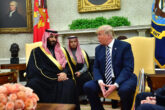August 05, 2020
How Biden Could Use Trump’s Trade War Thumbscrews to Fight Climate Change
Over the past two years, the view that the United States must take drastic action to address global climate change has gained strong support within the Democratic Party. In the U.S. Congress, 100 Democratic Representatives and 14 Senators have endorsed the Green New Deal, while presumptive Democratic nominee Joe Biden has called for spending $2 trillion to transform the economy in order to reduce greenhouse gas emissions and remove fossil fuels from the electricity supply by 2035. But even if Democrats win the election in November, continuing political dysfunction in Congress could stall legislative action to address what is arguably humanity’s greatest long-term challenge.
Global climate change is undeniably a crisis, arguably the single greatest national security challenge the United States faces, and certainly a vastly greater threat than many current targets of U.S. tariffs and sanctions.
Fortunately for supporters of aggressive curbs on global emissions, President Donald Trump has demonstrated a highly effective way to circumvent the legislative process. His use of national security laws to impose tariffs and sanctions sets a precedent for a future Democratic president to address climate change even if Congress fails to act. I have argued elsewhere that Trump has overused U.S. sanctions laws and that Congress should urgently enact procedural reforms to rein this in. But Congress has shown no inclination to limit presidential powers. The Supreme Court recently refused to hear a legal challenge to Trump’s tariffs on steel imports, leaving in place a broad lower court ruling affirming the president’s authority to impose tariffs based on his own interpretation of what constitutes a national security threat. That has created a clear opening for a future Democratic president to impose wide-ranging tariffs and sanctions to combat climate change.
Read the full article in Foreign Policy.
More from CNAS
-
Game Over?
The trade wargame suggests that sustained high tariffs could create leverage and urgency to spur action toward a productive restructuring of the international trade system....
By Emily Kilcrease & Geoffrey Gertz
-
Middle East Security / Energy, Economics & Security
Trump Inks $600 Bn Deal In Saudi Arabia | Musk, Blackrock CEO Flank Trump In Gulf VisitIn today's episode of India Global, U.S. President Donald Trump secured a $600 billion commitment from Saudi Arabia on Tuesday to invest in the United States. NDTV's Gaurie Dw...
By Daniel Silverberg
-
Energy, Economics & Security / Technology & National Security
Tariffs and Tech: An Uncertain RecipeHigher tariffs could prompt American cloud companies to shift more of their capital investments abroad....
By Pablo Chavez
-
Trump Tariffs: How Will U.S. Plans Reshape the Global Economy?
Donald Trump says he's already decided the tariffs he will impose on countries that export goods to America, including the United Kingdom. Channel 4 hears from Emily Kilcrease...
By Emily Kilcrease




